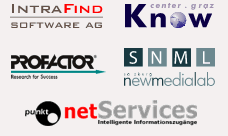Gerd Wagner: "Reasoning will support automated policy handling for service-oriented applications."
11.06.2007

Reasoning on the web is one of the hot topics when it comes to automated data and information processing. It is also one of the promising approaches in advancing IT applications and architectures. Tassilo Pellegrini talked to Prof. Gerd Wagner (University of Cottbus) about the challenges ahead and this year's Semantic Web Days that will take place from 19 - 20 of June 2007 colocated with the Business Rules Conference in Dusseldorf.
What are hot topics in current web reasoning R&D?
Research is focusing on the advancement of OWL-DL and on developing Web rule languages based on RDF or OWL-DL. There are also attempts to establish principles for reasoning with uncertainty on the Web. While these efforts are largely driven by the desire of transfering classical AI research results to the Web, there is another important driver for Web reasoning research: the Web services interoperation problem which requires the automation of policies and choreographies. However, one should also understand that automated reasoning on the Web is a special discipline, which can help to make certain Web applications more sophisticated, but it is not the key to all our problems. In fact, the automation of capabilities such as interaction and interoperation will be more important to advance the Web than the automation of reasoning on the Web. Of course, we hope that automated reasoning will help to achieve more sophisticated forms of interoperation. But this is yet more a research hypothesis than a proven fact.
The application of rule technologies requires the formal representation of objects and relationships. But human logic does not necessarily comply with formal logic. How does current reasoning research deal with this problem?
Rule technologies are very versatile. They may employ classical first-order logic (FOL), such as the OWL-DL-based Semantic Web Rule Language (SWRL), or they may use more computational logics, such as F-Logic or Common Logic. While the OWL-DL community seems to prefer the elegance and pureness of classical FOL, other research groups are more concerned with computational logic requirements such as using negation-as-failure for handling defaults and closed predicates according to the Closed-World Assumption, or tolerating inconsistency. This schism in Web reasoning research is nothing new, it has just been inherited from AI research.
Looking at the commercial aspect of reasoning, where do you see the benefits? Where are rule technologies already being applied?
Inference technologies are being increasingly applied, e.g. for consistency checking, in software engineering tools where the Object Constraint Language (OCL) is used for expressing logical conditions, integrity constraints, and queries. Similarly, there will be commercial tools that are able to check if a Web service request violates any policy of the service provider, or if a service complies with a given choreography. These policy violation and choreography compliance checks, however, will most likely not be based on classical FOL, but rather on certain computational formalisms that support defaults and tolerate inconsistency.
Concerning the use of business rules on the Web, I think that this will be driven by the need to support automated policy handling for service-oriented applications. Web service policies may come in the form of technology requirements, access rights or general business rules. They can be managed with the help of possibly specialised business rule technologies. Also, general rule markupn languages, such as The REWERSE Rule Markup Language R2ML or the W3C Rule Interchange Format RIF, will play an important role in Web service policy management.
What is the relationship between Semantic Web and reasoning? Is the first viable without the other?
The conception of the Semantic Web is tied to the vision of achieving intelligent behavior of Web applications by employing automated reasoning technologies. However, the common view that the core of the Semantic Web are RDF fact statements and OWL ontologies, as well as the inference technologies based on RDF and OWL, may well turn out to be too limited. In fact, policies and choreographies seem to be essential aspects of Web service semantics. And as Web services will play an increasingly important role, our view of Web semantics will change and also include dynamic aspects such as choreographies.
As a side note, I must say that it's remarkable that the popular WSMO approach to Semantic Web services does not follow the meanwhile well-established distinction between service ochestration and service choreography, but is rather using the term "choreography" in a completely different sense.
Reasoning will be a big issue at this year's Semantic Web Days in Düsseldorf from June 19 - 20, 2007. What will be the highlights? Who should attend?
The Semantic Web Days and the European Business Rules Conference are
targeted at business people, IT architects and developers, consultants,
and
researchers from all over Europe. This year, the Semantic Web Days are
part of the European Business Rules Conference. The two highlights are
the keynote talk by Benjamin Grosof on "The New Rules of Business:
Semantic Web as Disruptive Innovation" where he will argue that Seantic
Web rule technologies will radically change the business rules
industry, and a tutorial on Rule Modeling and Rule Interchange, which
will present a language-independent approach to the enginering of
rule-based Web applications.
About Gerd Wagner ...
Gerd Wagner is Professor of Internet Technology at the Brandenburg University of Technology at Cottbus, Germany. His research interests include agent-oriented modeling and agent-based simulation, foundational ontologies, (business) rule technologies and the Semantic Web. He is the leader of a work package on rule modeling and markup in the European research network REWERSE.net. He is also participating in the rule standardization activities of the Object Management Group and the World-Wide Web Committee.



